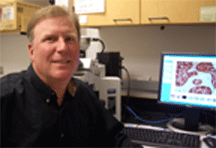
 |
|---|
| HOME | PEOPLE | RESEARCH OPPORTUNITIES | PUBLICATIONS | COLLABORATORS | LINKS | ALUMNI | CONTACT US |
|---|
| Mark
L. Day, Ph.D. Associate Professor Department of Urology University of Michigan |  |
|---|
|
Where
we have been……….. Our research focuses on epithelial homeostasis of the prostate and mammary gland, which is critically dependent on steroid hormones. Alterations in the levels of theses hormones or to signaling pathways meditated by their receptors results in apoptotic cell death, tissue involution and remodeling. Although well studied, the precise mechanisms that mediate these changes remain vague. We have determined that a potential target of hormone action during involution may be the intercellular junction of adjacent secretory epithelium. This is supported by the long standing observation that one of the first visible stages of prostate and mammary involution is the disruption of interepithelial adhesion prior to the onset of apoptosis. Nrf2 and free radical damage: Studies have indicated that reactive oxygen species (ROS) play a role in the onset of several age-related diseases including cancer. Increases in ROS result in oxidative damage to DNA, which leads to mutations that promote tumorigenesis. A recent study has demonstrated that ROS damage to DNA is increased in the TRAMP mouse model of prostate cancer. Nrf2 is a transcription factor that has been demonstrated to regulate the expression of antioxidant proteins and enzymes, such as glutathione-s-transferase, that detoxify secondary metabolites of oxidative stress. We have found that Nrf2 is down regulated in primary prostate tumors. However, it is unknown if the loss of Nrf2 results in mutagenic DNA damage in the prostate gland. DNA methylation and prostate cancer: DNA methylation is regulated by a family of DNA methyltransferase enzymes (Dnmt-1, Dnmt-3a and Dnmt-3b). Dnmt-1 has been implicated in the aberrant methylation of genes in some tumors including prostate cancer. Specific studies examining Dnmt-1 function in cells has demonstrated an association of Dnmt-1 and cellular transformation including decreased contact inhibition, increased genomic methylation, increased growth in soft agar and increased tumorigenicity. These data suggest that increased DNA methyltransferase levels and activity affect the methylation status of genes critical to tumor formation and progression. We have recently shown that Dnmt-1 is transcriptionally regulated by E2F-1 following the disruption of Rb. We have also shown that prostate tumorigenesis can be dramatically inhibited by the methyltransferase inhibitor, 5-aza-2’deoxycytidine (5-aza), in the TRAMP mouse model of prostate cancer. The ADAM15 disintegrin and prostate cancer metastasis:
Several protease
families including the ADAMs have been implicated in the regulation of
angiogenesis. It is thought that ADAMs proteolytically process some of
the key signaling components of inflammation and angiogenesis as well
as adhesion molecules that comprise endothelial adherens junctions including
vascular endothelial (VE)-cadherin, P-CAM-1, and integrins. VE-cadherin,
the endothelial-specific cadherin, is known to regulate vascular integrity,
endothelial cell migration, capillary tube formation and, as well as
regulate activity of the VEGF receptor VEGFR-2 activity. A novel role
for ADAM15 in endothelial adhesion was suggested by the observation that
the distribution of ADAM15 in endothelial cell junctions appeared driven
by VE-cadherin. We are currently studying ADAM15 in metastatic prostate
cancer. Interestingly, the chromosomal location of ADAM15, on 1q21, is
a region of specific high-level amplification in prostate cancer metastasis. |
|---|